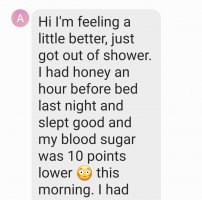Vileplume
Member
I recently got a glucometer, and I noticed that my blood sugar is always high. Not crazy high, but usually between 110-150 mg/dL. Even when I wake up in the morning, fasted, I'm at 115 or so. How can I get my blood sugar below 100?
I did carnivore, keto, and intermittent fasting all of last year before finding Peat, and thus far my blood sugar has not improved since "Peating". I seem to be very sensitive to carbs, but maybe I'm eating too much of them. For example, some of my meals contain 80-100 grams of carbs, in the form of honey, fruit, and milk. Usually the protein is around 25-35 grams per meal.
I'm thinking some of the following might help:
-limiting carb intake per meal to around 60g
-eating four or five meals per day, instead of three
-taking small doses of B1, B3, B7, aspirin, and pyrucet (2 drops) with each meal
-raising protein intake
-ensuring enough potassium, magnesium, and calcium
-limiting liquids
Any other ideas? What worked for you in lowering your blood sugar?
Thanks.
I did carnivore, keto, and intermittent fasting all of last year before finding Peat, and thus far my blood sugar has not improved since "Peating". I seem to be very sensitive to carbs, but maybe I'm eating too much of them. For example, some of my meals contain 80-100 grams of carbs, in the form of honey, fruit, and milk. Usually the protein is around 25-35 grams per meal.
I'm thinking some of the following might help:
-limiting carb intake per meal to around 60g
-eating four or five meals per day, instead of three
-taking small doses of B1, B3, B7, aspirin, and pyrucet (2 drops) with each meal
-raising protein intake
-ensuring enough potassium, magnesium, and calcium
-limiting liquids
Any other ideas? What worked for you in lowering your blood sugar?
Thanks.

